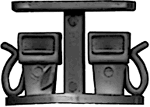
|

|

The Culture of Petroleum Here in California, we don't think about oil much unless we're forced to. And early in 1996, several things conspired to force us to. The price of crude oil had been going up worldwide and producers were drawing down their resources, as it looked like Iraq might again be allowed to sell oil on the world market. Arco's diesel refinery and Shell's gasoline refinery suffered serious fires that took them offline. And at the beginning of March, the California Air Resources Board implemented rules requiring that oil companies reformulate their fuels to reduce emissions.
To pay for this, they raised the price of gas. The price at the pump went up by about half. And the public went nuts. The newspapers were full of angry letters to the editor, callers to radio talk shows alleged conspiracies and price-fixing, the legislature voiced concern, the California Energy Commission took the first step toward declaring an energy emergency, and the gas stations posted anxious open letters to the public trying to explain that they weren't just jacking up prices because they thought they could get away with it. The point here is not that Californians are a bunch of big babies, though it's hard to avoid that conclusion. This incident illuminates one small facet of the bind that all citizens of developed nations are in. The structure of our daily lives depends on portable machines that do work for us, durable materials that house and clothe us, chemicals that fend off pests, and power that fends off darkness. The historian Gunther Barth once defined culture as "that set of tools that people make to cope with their environment." If that is so, then our culture is unquestionably a culture of petroleum. And the underpinnings of this culture are a mystery to us. During California's really quite mild price shock, I heard a Chevron executive on a radio talk show mention that while the company had redirected tankers from its oil fields in Finland to California to meet the sudden shift in demand, it would probably be 45 days before this move would be reflected in the price of gasoline. The show's host wondered, as I did, why that might be. "Well," said the executive, "that's how long it takes a tanker to get from Finland to California." This really shouldn't surprise anyone, but it sure surprised me, and I'll bet it surprises you. Most of us have learned the very few things we know about the oil industry that we depend on by hearing about something going wrong on the other side of the world. Suddenly we're paying more at the pump, or CNN is bringing us images of oil-fouled beaches in Brittany or Alaska, or our cousin in the army suddenly gets sent to Dharan. We know so little about the oil industry that its effect on us is like the weather: mysterious most of the time and little noticed unless it gets bad.
 We also don't have much of a sense of what having a culture of petroleum really means to us. True, rising gas prices may hit us in the wallet, and we may worry about pollution, and some of us might get cranky when we see US troops being mobilized to keep Iraq from moving on Kuwait again. But the picture is much bigger than that. For example, consider novelist and architectural historian James Howard Kunstler's description of a mall in Saratoga Springs, New York:
"The space between the buildings and the street now had one function: automobile storage. The street, and consequently the public realm in general, was degraded by the design of the mall. As the street's importance as a public place declined, townspeople ceased to care what happened in it. If it became jammed with cars, so much the better, because individual cars were now understood to be not merely personal transportation but personal home-delivery vehicles, enabling customers to haul away enormous volumes of merchandise very efficiently, at no cost to the merchandiser." This mall is a small example of the large-scale transformation of the cultural landscape that came as automobiles became universally affordable in the United States after the Second World War. As Kunstler describes at length in his book Home from Nowhere, American space is now designed to meet the needs of cars and drivers, while all other human needs have receded into the background. This has had devastating implications for the fabric of American society. It is certainly not just America whose landscape has been transformed by the culture of petroleum. Here is journalist Joshua Hammer, commenting on the state of things in Nigeria:
"For decades, Shell had pumped oil in the Delta virtually free of burdensome environmental regulations. There were few or no requirements to conduct environmental impact studies, recycle oil waste, or lay subterranean oil pipes instead of cheap aboveground pipes. According to Greenpeace, between 1982 and 1992, 37 percent of Shell's spills worldwide -- amounting to 1.6 million gallons - took place in the Delta . . . Each year, gas flares in Nigeria emit 34 million tons of carbon dioxide and 12 million tons of methane, making petroleum operations in Nigeria the biggest single cause of global warming." The industrial nations' thirst for petroleum has torn up Nigeria's landscape, turned traditional cultures on their heads, and left it with one of the most corrupt governments on earth and a growing problem of political violence.
But these unholy alliances exist because we need them to. Dedicated cyclists and off-the-grid homesteaders notwithstanding, the culture that most of us live in could not function without the portable power supply that is the internal combustion engine. And as anyone watching the economic development of southern China knows, it's a club that people around the world are clamoring to join. We need a better answer for the people who don't yet depend on petroleum (as well as for the people who already do) than "no no go away oil bad pollution evil corporations bad." And we'd better come up with one. |
rlauriston said: I narrowly avoided a car crash once--saw a truck losing control, floored the engine, looked in the rearview, and saw the truck jack-knifed across all four lanes of Interstate 80, and cars smashed up every which way. I think maybe that was when I refused to ride in cars for a couple of years. In any case it was much more disturbing than any of the three relatively minor crashes I was actually in myself. But it didn't make me horny--maybe that's because Rosanna Arquette wasn't along for the ride. Most Active Topics: Topic 108 Sites - Feedback from visitors Topic 98 C-Topia Zeit and Nancy Swim the Channel Topic 101 C-topia Prepping for Utne | |||
| ||||
Also in Technos: The Technology of Surgery Our New Cathedral Beethoven's Fifth Symphony | ||||
|
electric minds |
virtual community center |
world wide jam |
edge tech |
tomorrow |
conversations
Any questions? We have answers.
©1996, 1997 electric minds, all rights reserved worldwide.
|

 The oil companies spent buckets of cash upgrading their refineries and
repairing the damage. And they spent still more reconfiguring their
operations -- running double shifts, calling in tankers from other parts of
the world, and so on -- so that they could continue to meet the state's
800,000-gallon-a-day oil habit.
The oil companies spent buckets of cash upgrading their refineries and
repairing the damage. And they spent still more reconfiguring their
operations -- running double shifts, calling in tankers from other parts of
the world, and so on -- so that they could continue to meet the state's
800,000-gallon-a-day oil habit.
 It's all very easy to cluck our tongues about the ruination of American (and
English, German, and French) towns and the disruption of Nigeria (and
Kuwait, Venezuela, Indonesia, and Azerbaijan), and point our fingers at the
greed of the oil companies and Western governments.
It's all very easy to cluck our tongues about the ruination of American (and
English, German, and French) towns and the disruption of Nigeria (and
Kuwait, Venezuela, Indonesia, and Azerbaijan), and point our fingers at the
greed of the oil companies and Western governments.
